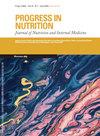低蛋白饮食评分:一种新的饮食质量指数和慢性肾病患者疾病进展的预测因子
4区 医学
Q4 Agricultural and Biological Sciences
引用次数: 0
摘要
背景和目的:慢性肾脏疾病(CKD)患者被推荐食用低蛋白饮食。然而,没有特定的指标来评估这些患者的饮食蛋白量和CKD进展。本研究的目的是确定低蛋白饮食评分(LPDS)作为CKD进展的预测指标和CKD患者饮食质量的指标。方法:在这项横断面研究中,选择了227名符合条件的CKD患者(3期和4期)。我们使用一份经过验证的食物频率问卷来评估患者的饮食摄入量。lpd的定义基于3个切点:>2 gr/kg (score=1)、1.01-2 gr/kg (score=2)和≤1 gr/kg (score=3)。采用生化评价法测定肾功能(即血尿素氮、血清肌酐)和心脏代谢指标(即低密度脂蛋白、甘油三酯、总胆固醇、空腹血糖、高敏c反应蛋白)。由于饮食中钠、钾、磷、饱和脂肪酸和胆固醇的摄入量很重要,我们使用这些营养素的摄入量来评估饮食质量。结果:得分越高的患者饮食质量越好,其摄入的磷、钾、饱和脂肪酸和胆固醇含量越低(P<0.01)。生化评价结果显示,得分较高的受试者血尿素氮较低,差异有统计学意义(P=0.06)。我们没有观察到在定义的lpd中其他生化变量有任何显著差异。在对所有混杂因素进行调整后,在lpd中显示CKD进展风险显著降低的趋势(P =0.04)。结论:本研究结果表明,较高的LPDS与CKD患者有利的营养摄入(钠、钾、磷、胆固醇和饱和脂肪酸摄入量较低)有关。此外,接受较高lpd的受试者的BUN较低。此外,我们观察到,在调整潜在混杂因素后,lpd与处于CKD高级阶段的风险呈负相关。因此,它是CKD进展的预测因子。本文章由计算机程序翻译,如有差异,请以英文原文为准。
Low protein diet score: a novel diet quality index and predictor of disease progression in patients with chronic kidney disease
Background and Aim: Patients with chronic kidney disease (CKD) have been recommended to consume a low protein diet. However, there is no specific index for evaluating amounts of dietary protein and CKD progression in these patients. The objective of this study was to define a low protein diet score (LPDS) as a predictor of CKD progression and an index of diet quality in patients with CKD. Methods: For this cross-sectional study, two hundred twenty seven eligible subjects with CKD (stage 3 and 4) were selected. We used a validated food frequency questionnaire to assess dietary intake of patients. LPDS was defined based on the 3 cut of points: >2 gr/kg (score=1), 1.01-2 gr/kg (score=2) and ≤ 1 gr/kg (score=3). Renal function (i.e., blood urea nitrogen and serum creatinine) and cardiometabolic variables (i.e., low density lipoprotein, triglyceride, total cholesterol, fasting blood sugar and high sensitivity C-reactive protein) were measured by biochemical assessment. As dietary intakes of sodium, potassium, phosphorus, saturated fatty acid and cholesterol are important, we used intake of these nutrients to assess diet quality. Results: Patients who received higher scores, had better diet quality because they consumed lower amounts of phosphorus, potassium, saturated fatty acid and cholesterol (P<0.01 for all). Biochemical assessments showed that in comparison with the bottom LPDS, a marginally significant lower blood urea nitrogen was observed among subjects with higher scores (P=0.06). We did not observe any significant difference in other biochemical variables across the defined LPDS. After adjusting for all confounders, a significant decreasing trend for risk of CKD progression was revealed across LPDS (P for trend=0.04). Conclusion: The results of the present study showed that higher LPDS was associated with favorable nutrients intake (lower intakes of sodium, potassium, phosphorus, cholesterol and saturated fatty acid) among patients with CKD. Moreover, subjects who received higher LPDS had a marginally significant lower BUN. Also, we observed that LPDS was inversely related to the risk of being in the higher stage of CKD after adjusting for potential confounders. Therefore, it was a predictor of CKD progression.
求助全文
通过发布文献求助,成功后即可免费获取论文全文。
去求助
来源期刊

Progress in Nutrition
医学-营养学
CiteScore
1.40
自引率
0.00%
发文量
0
审稿时长
>12 weeks
期刊介绍:
Progress in Nutrition was founded in 1999 as an independent magazine, a multidisciplinary approach, dedicated to issues of nutrition and metabolism.
 求助内容:
求助内容: 应助结果提醒方式:
应助结果提醒方式:


